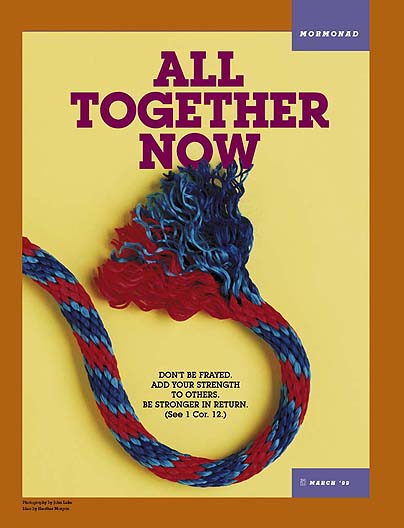I read an article a while back about Jabari Parker, the high school basketball star who is considered the best in the United States. The reporter mentioned that after a big win, he couldn’t find Jabari. The rest of the team was talking to reporters or meeting girls, but Jabari was nowhere to be seen. He was finally found handing out water to the junior varsity team. The reporter was amazed that the star of the game would rather be handing out water than getting well-deserved attention.
 During one of Mitt Romney’s political campaigns, he was sent inside someone’s garage to stay out of the heat while photographers set up a photo shoot. When they went to get him, he was cleaning out the garage for the owner.
During one of Mitt Romney’s political campaigns, he was sent inside someone’s garage to stay out of the heat while photographers set up a photo shoot. When they went to get him, he was cleaning out the garage for the owner.
Of course, for a Mormon, that kind of behavior isn’t really unusual. Sure, Mormon teens like attention as much as anyone and there are days they might choose to be out with the reporters or doing a little flirting. But they’ve also been taught from an early age to look for ways to help others.
One of the ways Mormon teens learn how to help others is by serving in church leadership positions. The teens run their own youth program. They have adult leaders, but the leaders provide what is called shadow leadership. That means that instead of running everything, they help the teens learn to do it themselves. If a teen class presidency started to plan an activity that was against the rules, for instance, the leader might say, “Have you checked the rule book to see if that is allowed?” That way, the teens are reminded to become familiar with the rules. The leader could just say, “You can’t do that. It’s against the rules.” But if they did, the teens would never learn to look up the rules themselves. If the teens are running an activity and don’t notice one girl is sitting off by herself without friends, the leaders might ask the teens if they’ve looked around to see if everyone is having fun. This will remind them that part of being in charge is noticing what the others around you are doing and then solving any problems you see. When the teens are having a problem, the leaders will ask questions rather than offering solutions so they will learn how to solve their own problems.
This means that the teens learn to pay attention to what needs to be done and then to do it, rather than to think that “someone” ought to fix it. Their parents do the same thing. They read the Bible and the Book of Mormon and see how Jesus served others all the time, even when no one asked for help. He noticed the person who was sick, the person too scared to come up and talk to Him, and the person who was lonely. He stepped in and did everything He could for them.
One day I was teaching a class of preschoolers. We were in a big room with the children and adults from all the classes for a little while. One of my little students looked behind him and noticed an adult standing in the back of the room. He got up, found a chair, and took it to her. It was clear to me his parents had taught him to notice when people need help and to not wait for an invitation to get involved.
Even if no one has taught you to do that, you can teach yourself. Tomorrow, when you’re at school or work or even at home, look around. Who could use a hand right now? Does your mom look like she needs a glass of lemonade? Do the dishes need doing? Is someone sitting alone at lunch? Does anyone look sad? What can you do to step in and help out? How many chances can you find in a single day to make a difference, even a small one, in the lives of the people around you?

